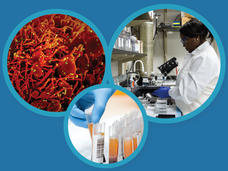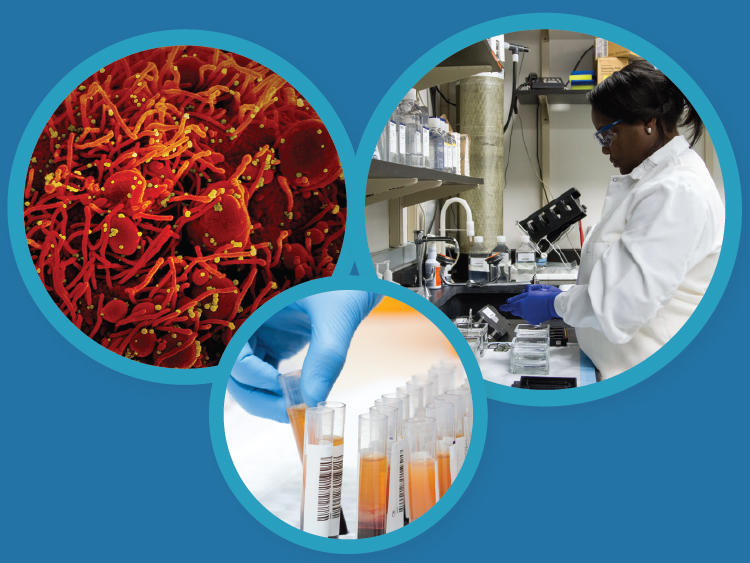, by Norman E. Sharpless, M.D.
Late last week, I convened an emergency meeting of two key NCI advisory boards, the Board of Scientific Advisors and the National Cancer Advisory Board.
This meeting was the first entirely virtual joint gathering of these two boards. It was held so that NCI leadership could bring board members up to date on the institute’s response to the COVID-19 pandemic, and also so that NCI could receive advice from the boards on our pandemic response plans. Watch a recording of the full meeting online.
So much about this meeting was extraordinary, not the least of which are the circumstances that required it. Needless to say, we are in the midst of an extremely challenging time, one marked by significant loss of life, an unprecedented economic downturn, and an unimaginable upheaval in daily life.
At NCI, we know that these problems are particularly acute for people with cancer and their families. Some patients are at higher risk of severe illness from COVID-19 because their cancer, or the treatment of that cancer, has left them weakened and more vulnerable to complications. In addition, many types of effective cancer treatments like palliative chemotherapy, surgery, and radiation have been postponed or cancelled to minimize the risk of exposure to the virus, but leaving these patients at higher risk of suffering from their cancer.
I’ve talked with many of my colleagues in cancer centers across the country, and they are deeply concerned. They and their institutions are also taking whatever steps possible to adapt to the situation as best they can, knowing it won’t always be enough to meet their patients’ needs.
At NCI we’re also adapting to the situation, taking measures to help keep the nation’s cancer research enterprise operating to the fullest extent possible. During last week’s meeting, I stressed to the board members that NCI’s number one priority is, and always will be, advancing cancer research and doing what we can to reduce the burden of cancer.
But I also reminded them that NCI, as the world’s largest cancer research organization, has tremendous expertise and unique research capabilities that make our participation in the response to this pandemic a moral obligation.
Indeed, as an organization, NCI has much to offer, including:
- a long history of virology research, including work that helped lead to the discovery of HIV and the first AIDS treatments, and the development and broad-scale testing of the HPV vaccine
- a nationwide research infrastructure that includes large academic institutions with top experts, experienced clinicians, and a proven track record of conducting complex clinical studies
- a huge portfolio of partnerships and collaborative relationships with government and public health institutions and private-sector companies
- the Frederick National Laboratory for Cancer Research (FNLCR), which houses advanced technologies and research resources that are of direct and immediate relevance to a viral pandemic
The board meeting largely focused on providing an overview of some of the activities specific to the pandemic NCI has embarked upon in the last 4 to 6 weeks. The sheer amount of work that’s been done, and the speed with which it’s been done, is nothing short of amazing.
Redirecting Resources and Expertise at Frederick National Lab
The FNLCR is the only Federally Funded Research and Development Center (FFRDC) dedicated to biomedical research. Located in Frederick, MD, FNLCR is a research powerhouse with top-notch scientists and cutting-edge technologies. As NCI Deputy Director Doug Lowy, M.D., explained during last week’s board meeting, FNLCR is perfectly suited to respond to a crisis like the coronavirus pandemic. And NCI is bringing those resources to bear in response to COVID-19.
Serology Testing: Assessing the Immune Response
Researchers at FNLCR have launched an initiative focused on serology, a word that, unexpectedly, has now entered the popular lexicon. Serology is the process of measuring a person’s immune response to an infection in the form of antibodies in the blood.
The HPV Serology Laboratory at FNLCR has long played a central role in helping to develop and standardize serology tests for antibodies to cancer-causing HPV types. The lab has been temporarily repurposed to work on serology testing for the novel coronavirus, including working with the Food and Drug Administration (FDA) to validate serology tests submitted to the agency by outside scientists and companies.
Staff in the HPV Serology Laboratory also are collaborating closely with colleagues at the National Institutes of Allergy and Infectious Diseases (NIAID), the Centers for Disease Control and Prevention, and several academic medical centers, including several in regions of the country hard-hit by the virus, like New York.
Serology testing will be necessary for the country to return to some semblance of normalcy by, among other things, identifying those who have had an infection and have evidence of immunity from COVID-19. Serology testing is also being used to screen blood from those who have had and recovered from COVID-19 for the production of convalescent plasma, a potential treatment for others with serious disease.
Understanding the Genetics of COVID-19 Outcomes
NCI has also launched a series of genomics studies to try to identify genetic alterations that are associated with good and poor outcomes from COVID-19. One study will specifically focus on people with cancer.
That effort is being led by Stephen J. Chanock, M.D., director of NCI’s Division of Cancer Epidemiology and Genetics—in partnership with investigators from NIAID and the National Human Genome Research Institute—and conducted largely through FNLCR. Using samples collected from people infected with the novel coronavirus, their goal is to rapidly identify genetic variants associated with an individual’s outcome to infection.
The hope is to not only better understand the biology of infection with this particular coronavirus, but also to identify potential targets for new treatments and provide insights that can possibly be used for screening purposes.
An important aspect of this effort will be to rapidly and broadly share the data from these studies with the research community.
Identifying Potential New Therapies for COVID-19
FNLCR is also home to NCI’s RAS Initiative, an effort to develop new therapies for cancers driven by mutated forms of RAS genes, particularly KRAS. Such cancers include highly deadly types like pancreatic and lung cancer, and thus efforts to create RAS-targeted therapies have been a high priority for the cancer research community.
FNLCR is now using some of the advances made via the RAS Initiative to try to identify new therapies for COVID-19. Part of that effort includes a resource, known as a screening library, that has been used successfully to identify chemical compounds that can block the activity of the mutated KRAS proteins that drive tumor growth.
That screening library is now being used to identify potential chemical compounds that can block the activity of a key enzyme, known as a protease, that the novel coronavirus relies on to make more copies of itself in infected cells.
In collaboration with the Argonne National Laboratory at the University of Chicago (another FFRDC), compounds identified in these screens that block the activity of this protease will undergo additional testing and refinement to develop them into potential therapies for COVID-19.
Adapting Cancer Clinical Trials, Launching New Trials
Not surprisingly, the COVID-19 pandemic has had a substantial impact on cancer clinical trials. I have spoken with directors and other staff from NCI-designated cancer centers and this is a serious concern.
As NCI Deputy Director Jim Doroshow, M.D., reported at the board meeting, accrual to NCI-funded treatment clinical trials has dropped by half, a trend that is expected to persist. Accrual to certain trials has continued—for example, those offering life-saving therapies or those for patients who have no other options for therapy—but accrual to most other types of trials has sharply declined.
In response, NCI has worked with FDA and NCI’s clinical trials programs to implement numerous measures to limit disruptions to trials. These steps entail allowing much more flexibility in trial operations, including:
- directly shipping orally administered drugs being tested in a trial to patients or their local physicians
- allowing standard testing and assessments that would usually require in-person visits by patients to the trial site to be conducted by a patient’s local physician, who can then send the results to the trial investigators
- much greater flexibility in complying with requirements written into clinical trials for conducting follow-up tests and reporting data
These are just some of the many changes that have been made to ensure that trials can proceed and produce meaningful data.
In addition to changes to ongoing cancer trials, NCI is working with collaborators to launch clinical studies specific to patients affected by cancer and COVID-19. That includes a “compassionate use” protocol for the drug tocilizumab (Actimra) in cancer patients with COVID-19 who have severe respiratory complications thought to be caused by a hyperactive immune response known as cytokine release syndrome.
The protocol—which will make the drug available to up to 200 patients who are not able to enroll in an ongoing phase III clinical trial of the drug being run by the drug’s manufacturer, Genentech—was written in 4 days by NCI investigators. The eligibility criteria for the study are planned to be adjusted so that both adult and pediatric patients undergoing treatment (including stem cell transplants and immunotherapy) are included. NCI is working with Genentech to get the protocol launched as quickly as possible.
In addition, plans are being finalized for a large clinical cohort study of people with cancer who have COVID-19, involving all of NCI’s clinical trials programs (e.g., NCTN, NCORP).
This study will collect comprehensive documentation from more than 2,000 patients of all ages—such as their cancer type, the treatments they receive, and their symptoms—and follow them for an extended period to better understand the virus’s effect on people with cancer.
This effort will contribute to the serology and genomics studies being conducted at FNLCR as well.
Silver Linings and Next Steps
One thing that stands out to me is that some positive developments have emerged from this otherwise terrible situation.
Among them, we have seen that telehealth is having its moment. As I said at the meeting, researchers involved in implementation science will have a unique opportunity to analyze the impact that telehealth has had on our ability to manage patient care during this pandemic and how telehealth can be most effectively used, and expanded, going forward.
I predict that those being treated for cancer are going to like having some of their care delivered by telehealth, and that many will want to continue using telehealth for some aspects of their care long after the pandemic has ended.
It’s also been inspiring to witness how quickly government health agencies can move when we really need to. New research efforts have been developed and launched with remarkable speed. Processes that can take months or longer have happened sometimes in a matter of days.
As we heard during the board meeting, NCI-designated cancer centers have also taken bold and fast action. Many have already launched clinical trials involving cancer patients with COVID-19, on their own or in collaboration with other cancer centers.
In my opinion, we have learned some important lessons that will change, for the better, how we plan and conduct research and how we care for patients.
As NCI continues our work to make progress in cancer research while also contributing to the global effort to address COVID-19, we will continue to use many communication channels to keep the community informed of our activities. That includes more information on the initiatives described here and others, and the evolving impact of this pandemic on the research community, including a high-priority group for NCI: investigators who are early in their careers.
In the meantime, please stay safe. And please continue to follow directives from public health officials on physical distancing and other measures that will help us to flatten the curve of this pandemic—and, hopefully soon, allow us to begin to emerge from it.








